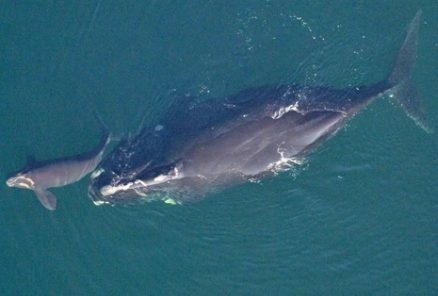Tag Archives: Right whale entanglements

How Did Gulf of Maine Lobster Get Canceled?
No one confessed to knowing that, just a few weeks before, the Monterey Bay Aquarium’s Seafood Watch, an agenda setting program for sustainability-minded seafood buyers and chefs, had shocked the industry by placing Gulf of Maine lobster on its “red list” of species to avoid. Not Dodie Neo, an Ohioan retiree who’d been in line for 45 minutes when I approached her. Knowing about the red listing, however, wouldn’t have stopped her from ordering. “The aquarium has a right to put lobster on whatever list it wants,” she told me. “And I have a right to eat it.” Way down the road, at Highroller Lobster Co., in Portland’s Old Port, the crowd skewed younger and hipper, but wait times were just as long and customers just as surprised to hear about lobster getting canceled. After some discussion, most in line seemed to agree with Rick Conlin, visiting from western Massachusetts, that it didn’t much matter. “I vote for the lobstermen,” he said. >click to read< 10:23

DFO Policy Puts Harvester Lives and Livelihoods at Risk
A new ‘weak rope’ gear policy being implemented in Newfoundland and Labrador will have negative implications for fish harvesters in this province, including risks to safety, an unknown cost burden, and significant potential for increased environmental waste. Weak rope measures are being implemented with the goal of preventing right whale entanglements. While these entanglements may be a concern for fisheries in Nova Scotia and New Brunswick, there has never been a right whale entanglement in the Newfoundland and Labrador fishery.,, “The death of one right whale could have a disastrous impact on seafood exports to the United States. Fish harvesters know this and will gladly take all reasonable steps to protect the species and their livelihoods but implementing this policy without any due diligence is entirely unreasonable,” >click to read< 10:55

Lobstermen tell regulators: Give us fewer buoy lines, but let us fish them how we want
Brian Tripp, a Sedgwick lobsterman, urged Maine to adopt a buoy line tagging system to help reduce the number of lines that link a fisherman’s buoys to his traps by 50 percent, which is what federal regulators say it will take to protect the endangered right whale from deadly entanglements. Under current state law, most Maine fishermen have a right to fish up to 800 of these surface-to-seabed lines. To meet the federal risk reduction goal, Maine can issue each fisherman 400 buoy line tags, Tripp said – half the number they are allowed to have now. Fishermen could live with that if they had the freedom to fish those 400 buoy lines how they want, he said. >click to read<11:21

Regulators unveil new tool designed to help reduce right whale entanglements
Federal fisheries regulators demonstrated a new risk-assessment tool on Tuesday aimed at helping the survival of the North Atlantic right whale. It comes on the eve of regulatory decisions that could affect the fate of the endangered species — and the lobster industry, as well. Federal scientists said the new data model should help lobstermen and conservationists make collaborative decisions about reducing dangers that fishing gear poses for the endangered. >click to read<12:49
Right whale entanglements: Scientists, engineers, fishing industry are collaborating with little success
 After three recent fishing gear entanglements involving the rare North American right whale, a Boston researcher says collaboration between fishers, biologists, and engineers isn’t fixing the problem. While attitudes are evolving, the historically adversarial relationship between scientists and fishing industry stakeholders has been bad news for the whale population. Consortium for Wildlife Bycatch Reduction director Tim Werner said the group has looked at myriad solutions since it was formed a decade ago, including ropes that glow in order to warn whales, gear with a lower breaking strength that can still hold up to the rigours of fishing, and acoustic releases that eliminate the need for ropes altogether. Read the story here 10:51
After three recent fishing gear entanglements involving the rare North American right whale, a Boston researcher says collaboration between fishers, biologists, and engineers isn’t fixing the problem. While attitudes are evolving, the historically adversarial relationship between scientists and fishing industry stakeholders has been bad news for the whale population. Consortium for Wildlife Bycatch Reduction director Tim Werner said the group has looked at myriad solutions since it was formed a decade ago, including ropes that glow in order to warn whales, gear with a lower breaking strength that can still hold up to the rigours of fishing, and acoustic releases that eliminate the need for ropes altogether. Read the story here 10:51












































